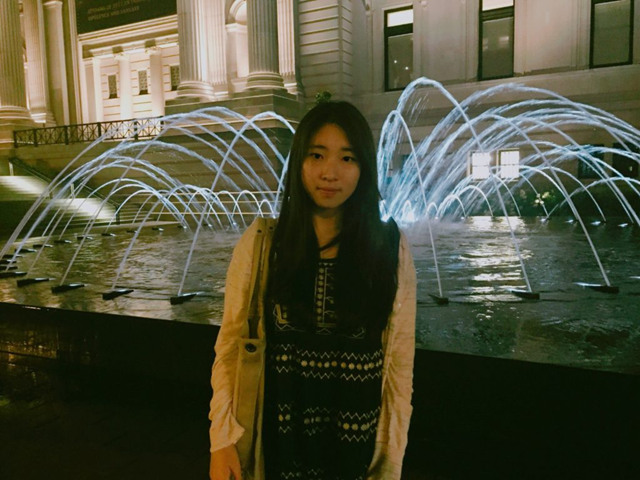The start of the New Year marked an exciting change in my life: I flew across the pond from my home in Manhattan, New York City, all the way to Cardiff for my exciting work placement at DECIPHer.

My name is Caroline Kim, and I am a third-year health sciences student at Northeastern University in Boston, USA. In contrast to universities here, which tend to be only for three years, American universities generally last for four years. When I go back in the fall, I’ll be finishing up my degree and working at Brigham and Women’s Hospital, an affiliate of Harvard Medical School. I’m also currently applying to medical school, which is typically a postgraduate programme in the United States.
My home institution has a cooperative education program (also dubbed as “co-op”) where students alternate semesters of academic study with semesters of full-time employment in positions related to academic or career interests. During the application process, my ultimate goal was to find a co-op that aligned with my interest in public health while also giving me an opportunity have real, tangible impact on society.
Prior to my work here, I had worked with the Department of Gastroenterology at NYU Langone Medical Center for several years, where I was able to observe first-hand how public health policies can influence an entire community’s health and treatment. The experience inspired me to take a more active approach in learning about the impact of policy decisions on local communities both domestic and abroad.
In Boston, I’ve worked with the Institute of Urban Health Research and Practice to help develop initiatives that hope to eliminate healthcare disparities within the city of Boston. Working alongside the Boston Government, Global Resilience Institute, and the Northeastern School of Law, I analysed the impact of sanctuary cities on the health and well-being of city residents, particularly for members of marginalized social groups like refugees. This not only reaffirmed my passion for helping these communities but developed my capacity to investigate the philosophical grounding, legal frameworks, and the quantitative data behind different policies.
When I spoke with Dr. G.J. Melendez-Torres and Dr. Rhiannon Evans during my interview, I immediately knew that the work being done at DECIPHer would be immensely meaningful because a lot of focus is placed on examining under-researched areas. Moreover, the institute has wide reach to impact further research and public health policy not only in the United Kingdom, but around the world. At the institute, I’ve been learning how to evaluate complex public health interventions, where several interacting components make analysis more complicated than simpler interventions.
I am currently working on an “Overview of Reviews” (OoR) on intimate partner violence, so I’ve been screening through thousands of search results and abstracts to find suitable literature to include in the review. It has been really exciting learning about the protocol and about the overall process, more so because I’ve only learnt about these reviews via textbooks and lectures, not through the experience of actually conducting them. After the OoR is published, I hope to work on my own systematic review & meta-analysis using some of the national data collected by SHRN surveys.
Another project I’ve been working on is the analysis for a publication on dating and relationship violence (DRV) in British adolescents. While some research has been conducted on the population as a whole on this widespread public health issue, not much focus has been placed on evaluating the prevalence of violence in adolescents, particularly in the United Kingdom, where the characterisation of DRV excludes young people with ages below 16. The current evidence on this prevalence is equivocal, and with the publication of this paper, we hope to produce a national sample of the prevalence.
In April, I’ll be working on the WISE study, which assesses British school teachers’ emotional well-being alongside school children’s well-beings. Not only will this research provide national-level health data, but there will be fieldwork involved, where I’ll be able to visit some of these schools!
Perhaps the best part about DECIPHer is how welcoming and kind everyone’s been. Prior to my placement here, I was worried that I wouldn’t be able to adjust to the life in Cardiff. On the contrary, thanks to everyone here, I consider Cardiff my new home. I’m really grateful to be able to pursue some of my personal goals during my placement here and consequently, receiving support to achieve these goals.
Working with such passionate researchers at DECIPHer was more than I could’ve ever dreamed of. During my work here, I hope to research under-recognised areas of public health to make a tangible impact on marginalized populations and build public awareness regarding such implications. It’s inspiring to see the work that’s being done today, but I’m particularly excited about what can be laid out for the future.
Image courtesy of kaysha, Flickr Creative Commons.